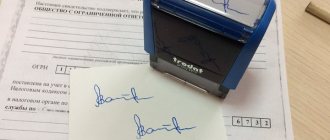Home — Articles
Do you work as an accountant in an organization (for an entrepreneur) that applies a general taxation regime, the company’s turnover is small (up to 2 million rubles per quarter), and among its counterparties there are mainly special regimes? But for some reason you cannot switch to a simplified system, for example because the share of participation of other companies in your organization is more than 25% (Subclause 14, clause 3, Article 346.12 of the Tax Code of the Russian Federation)? You have a completely legal way to get rid of VAT for at least a year - get an exemption from it (Article 145 of the Tax Code of the Russian Federation). Many people are aware of this possibility, but when it comes to applying the exemption, various questions inevitably arise.
What is the beauty of liberation?
For 12 calendar months (they begin to flow from the month in which you notified your Federal Tax Service of your desire to receive an exemption), you will not have to : - charge and pay VAT on transactions in the domestic Russian market. And “input” VAT on purchased goods (works, services) is included in their cost; — issue advance invoices and those invoices that you issue for yourself in one copy (for example, when performing construction and installation work); — submit tax returns (Decision of the Supreme Arbitration Court of the Russian Federation dated February 13, 2003 N 10462/02; Letter of the Federal Tax Service of Russia for Moscow dated November 17, 2009 N 16-15/120379).
What will liberation not save you from?
You will have to pay VAT : - when importing goods (Clause 3 of Article 145, paragraph 4 of paragraph 1 of Article 146 of the Tax Code of the Russian Federation); - when performing the duties of a tax agent for VAT (for example, when leasing state or municipal property) (Article 161 of the Tax Code of the Russian Federation). In addition, despite the exemption, you will have to: - issue shipping invoices to customers in which VAT is not allocated and the note “Without tax (VAT)” is made (Clause 5 of Article 168 of the Tax Code of the Russian Federation). Ignoring this requirement for at least one quarter is fraught with a fine from the inspectorate of 10,000 rubles. And if invoices were not issued for two or more quarters - then 30,000 rubles. (Article 120 of the Tax Code of the Russian Federation); — maintain books of purchases and sales, as well as journals of received and issued invoices. After all, those exempt from VAT do not cease to be its payers (Clause 3 of Article 169 of the Tax Code of the Russian Federation), they simply receive a temporary tax benefit. In addition, the sales book and journal will be needed later in order to confirm compliance with the revenue limit for the period of application of the exemption, as well as to extend the exemption. You will also have to submit to the inspection VAT declarations for those quarters in which you (Clause 3 of the Procedure, approved by Order of the Ministry of Finance of Russia dated October 15, 2009 N 104n): ( or ) being exempt from VAT, still issued an invoice with allocated tax amount (Letter of the Ministry of Finance of Russia dated July 16, 2009 N 03-07-14/69). The submitted VAT will have to be paid to the budget, but you will not lose the right to be exempt from VAT (Letter of the Ministry of Finance of Russia dated May 31, 2007 N 03-07-14/16); ( or ) acted as a tax agent for VAT (Clause 1 of the Procedure, approved by Order of the Ministry of Finance of Russia dated October 15, 2009 N 104n); ( or ) paid VAT when importing goods from Belarus or Kazakhstan (Clause 3 of Article 145, paragraph 4 of paragraph 1 of Article 146 of the Tax Code of the Russian Federation; Order of the Ministry of Finance of Russia dated July 7, 2010 N 69n).
Extension of the VAT exemption period
Exemption from VAT is given for a period of 12 calendar months. Tax relief is not given for a shorter period. To waive the exemption, you must contact the tax office. Upon restoration of VAT payment, the taxpayer must pay all payments from which he was exempted during the relief period. If, after the end of the grace period, an organization decides to return to the normal tax regime, then it must send a corresponding notification to the tax and finance inspectorate.
If a company decides to extend the VAT exemption, then it is necessary to provide current documents with the initial application that confirm the grounds for such a tax benefit. If the tax office does not accept the application, the organization receives a corresponding notification.
- VAT benefits: their types, limitations and presentation procedure
- Account 10 Materials in accounting: postings, examples, subaccounts
- VAT tax in Russia: definition, types, accounting
- Separate VAT accounting: 5 percent VAT rule and calculation example
Who is eligible for release?
You can receive an exemption from VAT if (Clause 1, 2 of Article 145 of the Tax Code of the Russian Federation): - your revenue excluding VAT for the 3 months preceding the month from which you intend to apply the exemption did not exceed 2 million rubles; - you do not sell excisable goods (for example, alcohol, tobacco, gasoline (Article 181 of the Tax Code of the Russian Federation)) or keep separate records of transactions for the sale of excisable and non-excisable goods (Clause 3 of the reasoning part of the Definition of the Constitutional Court of the Russian Federation of November 10, 2002 N 313-O) ; — your company is not a participant in the Skolkovo project. Some people think that the presence of arrears on VAT or other taxes is an obstacle to obtaining an exemption. This is not so, as a specialist from the Ministry of Finance confirmed to us.
From authoritative sources Elena Nikolaevna Vikhlyaeva, Advisor to the Indirect Taxes Department of the Department of Tax and Customs Tariff Policy of the Ministry of Finance of Russia “Article 145 of the Tax Code of the Russian Federation does not link the application of VAT exemption to the taxpayer’s absence of arrears on this tax or other taxes.”
Sample statement for VAT exemption
In order for VAT exemption to occur legally, you need to provide the tax office with a corresponding extract. Its completion is regulated by paragraph 6 of Article 145 of the Tax Code of the Russian Federation. The information that should be included in this statement can be obtained from the accounting registers. You will also need data on the volume of revenue from transactions with zero VAT and goods sold:
In the amount of revenue, according to the resolution of the Ministry of Finance, it is not necessary to take into account certain data:
- firstly, you do not need to indicate the prepayment received in the statement;
- or the cost of goods that were transferred free of charge.
When the package of documents has been prepared, you can begin filling out the statement. It is important that all information presented in it is truthful and reliable.
Which revenue should be taken into account when testing eligibility for exemption and which should not?
The Tax Code does not answer this question. If you read literally Art. 145 of the Tax Code, it turns out that absolutely all revenue must be taken into account, even that which is not subject to VAT. There have been no clarifications on this topic for a long time. Therefore, we turned to a specialist from the Ministry of Finance.
From authoritative sources Vikhlyaeva E.N., Ministry of Finance of Russia “When calculating revenue for the purposes of VAT exemption, it is necessary to take into account all proceeds from the sale of goods (including excisable goods), works, services (excluding tax), including revenue: - from operations, not subject to VAT (Article 149, paragraph 2 of Article 156 of the Tax Code of the Russian Federation); — from transactions not recognized as subject to VAT (Clause 2 of Article 146 of the Tax Code of the Russian Federation); - from the sale of goods (performance of work, provision of services), the place of sale of which is not recognized as the territory of the Russian Federation (Articles 147, 148 of the Tax Code of the Russian Federation). At the same time, revenues should not include amounts received from retail trade subject to UTII if the VAT payer combines the general taxation regime with the payment of an “imputed” tax.”
Note: some courts believe that for the purposes of VAT exemption it is not necessary to include in revenue amounts received from transactions that are not subject to VAT or do not form an object for this tax (Resolution of the Federal Arbitration Court of the ZSO dated March 20, 2012 in case No. A45-11287/2011; FAS VSO dated 01/18/2011 in case No. A19-9447/10; FAS SKO dated 06/10/2011 in case No. A01-1343/2010). But there are those who share the position of the tax authorities (Resolution 12 AAS dated 03/06/2012 in case N A06-1876/2011; FAS PO dated 11/10/2011 in case N A06-1875/2011; FAS SZO dated 11/30/2010 in case N A66-3032/2010).
Free transfer of goods
Situation: when calculating the revenue limit for VAT exemption, is it necessary to take into account the cost of donated goods (work, services)?
No no need.
When determining the limit, proceeds from the sale of goods (work, services) are used (clause 1 of Article 145 of the Tax Code of the Russian Federation). In this case, revenue refers to income in cash and in kind received by an organization from the sale of goods (work, services) (clause 2 of Article 153 of the Tax Code of the Russian Federation). With the gratuitous transfer of income, the organization does not generate income (Article 41 of the Tax Code of the Russian Federation).
Thus, despite the fact that the gratuitous transfer of goods (work, services) is recognized as an object of taxation (paragraph 2, subparagraph 1, paragraph 1 of Article 146 of the Tax Code of the Russian Federation), the organization does not receive any revenue from this operation. Therefore, when calculating the limit for VAT exemption, do not take into account the cost of donated goods (work, services).
Similar clarifications are contained in the letter of the Ministry of Finance of Russia dated September 30, 2013 No. 03-07-15/40261.
Example of calculating revenue for using VAT exemption
LLC "Torgovaya" sells non-excisable goods. From May 1, the organization decided to take advantage of the right to exemption from VAT.
To do this, the accountant determined the revenue from the sale of goods for the period February–April. At the same time, the accountant did not include advances received from buyers in the calculation. Revenue excluding VAT for the specified period amounted to:
- from the sale of fixed assets – 50,000 rubles;
- from the sale of non-excisable goods – RUB 1,450,000.
The total amount of revenue that is taken into account when determining the right to exemption from VAT is 1,500,000 rubles. (RUB 50,000 + RUB 1,450,000). It does not exceed 2,000,000 rubles. Therefore, from May 1, Hermes can take advantage of the exemption and not pay VAT on the sale of non-excise goods and other property not subject to excise taxes (fixed assets, materials, etc.).
And if there is no income, can the exemption be applied?
If there was no revenue for the previous 3 months before the exemption was applied, then it was zero. Zero, as you understand, is less than 2 million rubles. Therefore, it seems that nothing prevents the application of exemption. The same point of view was expressed (albeit for a long time) by Moscow tax officials (Letter of the Federal Tax Service of Russia for Moscow dated September 4, 2006 N 19-11/077487). However, soon after this, the Ministry of Finance issued a Letter with the opposite position (Letter of the Ministry of Finance of Russia dated March 28, 2007 N 03-07-14/11). Even now, financial department specialists are against the release.
From authoritative sources Vikhlyaeva E.N., Ministry of Finance of Russia “If during 3 consecutive calendar months preceding the month from which the taxpayer would like to apply the VAT exemption, he had no revenue from the sale of goods, works, services, then there are grounds for using the exemption not available".
Grounds for receiving benefits
Exemption from the tax burden is possible only for a list of entrepreneurs who meet certain criteria within the framework of legislation introduced into the Tax Code of the Russian Federation in 2020 and amended in 2020.
Important: such benefits do not apply to medical and pension contributions.
The main criteria for obtaining a grace period are the turnover of the entrepreneur or company.
For them to become the basis, it is necessary to calculate the revenue for 3 consecutive months, and the total amount must be within 2 million rubles.
It is important:
- Take into account the entire turnover of excise and non-excise goods.
- Non-excise goods are not subject to the required type of tax.
- Those entrepreneurs who trade exclusively in excisable goods can also be freed from the burden:
- Beer;
- Alcohol;
- Tobacco;
- Gasoline;
- Passenger cars.
Obtaining this exemption is available to entrepreneurs who have worked for the last 3 months and had a turnover.
Also, newly created companies with a limitation date of 12/31/2020 are exempt from paying taxes for up to 2 years, starting from the quarter in which the certificate was received.
What is VAT exemption and what laws it is regulated by – see this video tutorial:
https://www.youtube.com/watch?v=9-9pEBC5kgs
How to get exemption?
It is necessary to submit to the inspectorate at the place of registration a notification about the use of the right to exemption in the approved form (Approved by Order of the Ministry of Taxes of Russia of July 4, 2002 N BG-3-03/342), as well as certain documents (Clause 3, 6 of Article 145 of the Tax Code of the Russian Federation) .
| The situation at the time of submitting documents for release | List of submitted documents |
| You are in general mode | — an extract from the balance sheet (for organizations) or from the book of income and expenses and business transactions (for entrepreneurs); — extract from the sales book; — a copy of the log of received and issued invoices |
| You switch to general mode: | Extract from the relevant book of income and expenses |
| (or) with the simplified tax system or unified agricultural tax | |
| (or) with UTII | An extract from the balance sheet (for organizations) or from the book of income and expenses and business transactions (for imputed entrepreneurs who keep records) |
An extract from the balance sheet must be made on the 1st day of the month from which you began to apply the exemption, and extracts from books and magazines must be made for the 3 months preceding the exemption. All extracts can be submitted to the Federal Tax Service in any form. Or you can submit regular photocopies of balance sheets, income and expense books, sales books as an extract, certified by the signature of the manager (entrepreneur) and seal.
We warn the manager If a company, being exempt from VAT, issues an invoice with tax to please the client , then, despite the exemption, it will have to pay VAT to the budget .
These documents must be brought to the inspection no later than the 20th day of the month in which you began to apply the exemption (Clause 3 of Article 145 of the Tax Code of the Russian Federation). If you send them by mail, then do it 6 working days before the 21st day of the specified month (Clause 6, Article 6.1, Clause 7, Article 145 of the Tax Code of the Russian Federation), and preferably by registered mail with a list of the attachments. Let's say you wanted to apply the exemption from May 2012. Then the notification had to be submitted no later than May 21, since May 20 is a day off (Clause 7, Article 6.1 of the Tax Code of the Russian Federation). The last day to mail the notice was May 14. We do not advise you to be late in submitting your documents, since the tax authorities will probably consider that in this case you are not entitled to VAT exemption. The Ministry of Finance specialists agree with them.
From authoritative sources Vikhlyaeva E.N., Ministry of Finance of Russia “Failure to submit to the tax authority within the prescribed period the documents required for VAT exemption means that the taxpayer does not have the right to use this benefit.”
Accordingly, having discovered that you are using the exemption, and the documents were sent after the established deadline, the inspectors will certainly not miss the opportunity: - charge you VAT from the month in which you started using the exemption, and penalties; — fine for non-payment of tax and failure to submit declarations; — block an account for failure to submit a declaration (Clause 3 of Article 76 of the Tax Code of the Russian Federation; Resolution of the Federal Antimonopoly Service of the Eastern Military District dated April 20, 2011 in case No. A29-5471/2010). By the way, similar problems await you if the tax authorities subsequently find out that the documents you submitted contained false information and in fact you did not meet the two-million dollar revenue limit (Clause 5 of Article 145 of the Tax Code of the Russian Federation).
Note Some courts believe that late submission of documents (Resolutions of the FAS ZSO dated November 24, 2011 in case No. A75-265/2011; FAS SZO dated December 7, 2010 in case No. A42-2169/2010; FAS PO dated August 10, 2010 in the case N A49-11485/2009), their submission before the start of the tax audit or failure to submit at all (Resolutions of the Federal Antimonopoly Service of Ukraine dated 02/21/2011 N F09-11622/10-S2, dated 08/21/2009 N F09-5886/09-S2) do not deprive the taxpayer the right to apply for an exemption if all other conditions are met. But there are those who think differently (Resolutions of the Federal Antimonopoly Service of the Eastern Military District dated 06/09/2011 in case N A29-5506/2010; 18 AAS dated 07/04/2011 N 18AP-5721/2011; 3 AAS dated 12/12/2011 in case N A33-3048 /2011). Therefore, it cannot be guaranteed that you will be able to recover additional charges and fines through the court.
Already from the beginning of the month in which you promptly submitted a notice of release to the inspectorate with all supporting documents, you will be required to use the benefit, since it cannot be refused (Clause 4 of Article 145 of the Tax Code of the Russian Federation). This means that you will not have the right to claim VAT deductions. You can return to the general procedure for calculating and paying VAT only when 12 consecutive calendar months have expired from the beginning of the exemption. In this case, it is better for you to submit to the inspection a notice of refusal to use the right to exemption in any form (Letter of the Ministry of Taxes and Taxes of Russia dated September 30, 2002 N VG-6-03 / [email protected] ).
Attention! Having submitted documents for VAT exemption, you do not need to wait for any special permission from the tax authorities to apply the benefit.
What should you do before you start applying the exemption?
From the month in which you begin to apply the exemption, “input” VAT on purchased goods, works, and services will need to be taken into account in their cost (Subclause 3 of clause 2 of Article 170 of the Tax Code of the Russian Federation). Therefore, in the quarter preceding the release, you must restore and pay to the budget the “input” VAT, previously accepted for deduction, on all of your remaining inventories, fixed assets and intangible assets (Clause 8 of Article 145 of the Tax Code of the Russian Federation). For fixed assets, the tax must be restored from their residual (book) value according to accounting data (Subclause 2, clause 3, Article 170 of the Tax Code of the Russian Federation; Letter of the Ministry of Finance of Russia dated 04/12/2007 N 03-07-11/106; Resolution of the Federal Antimonopoly Service of the Eastern Military District dated 04/14/2011 in case No. A43-14553/2010), while the restored tax is included in other expenses. Let us remind you that real estate has its own special procedure for VAT recovery, prescribed in clause 6 of Art. 171 Tax Code of the Russian Federation.
Note Some courts believe that for OS and intangible assets it is not necessary to restore VAT before exemption (Resolutions of the Federal Antimonopoly Service dated November 21, 2011 in case No. A55-736/2011; Federal Antimonopoly Service DVO dated June 1, 2010 No. F03-3642/2010).
Also, while you have not yet become an “osvobozhdeniye”, you can deduct the tax paid on the advances received, but on the condition that (Clause 5 of Article 171 of the Tax Code of the Russian Federation): (or) you terminate the previously concluded agreement and return the advance back ; ( or ) you will change the terms of the contract price and return only the amount of advance VAT. If you do not return anything to customers, then upon shipment you do not declare a deduction of VAT from the advance payment, but you do not need to charge VAT on the cost of the goods shipped.









